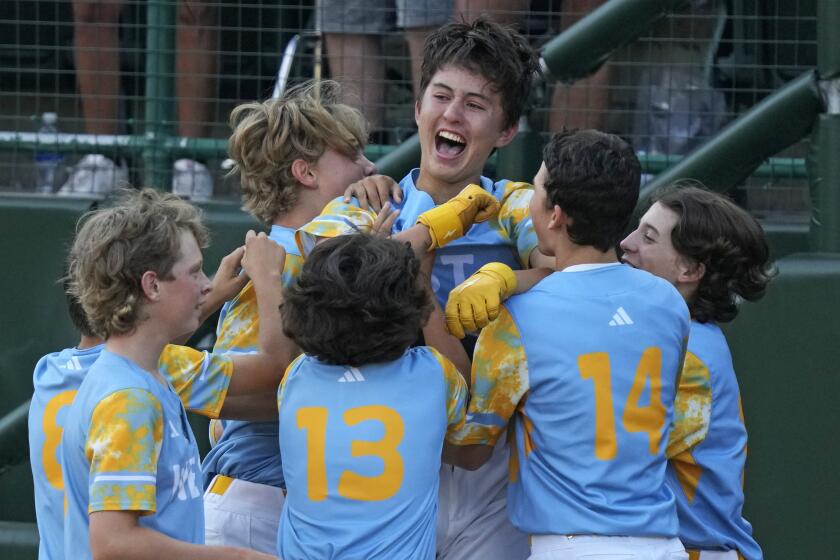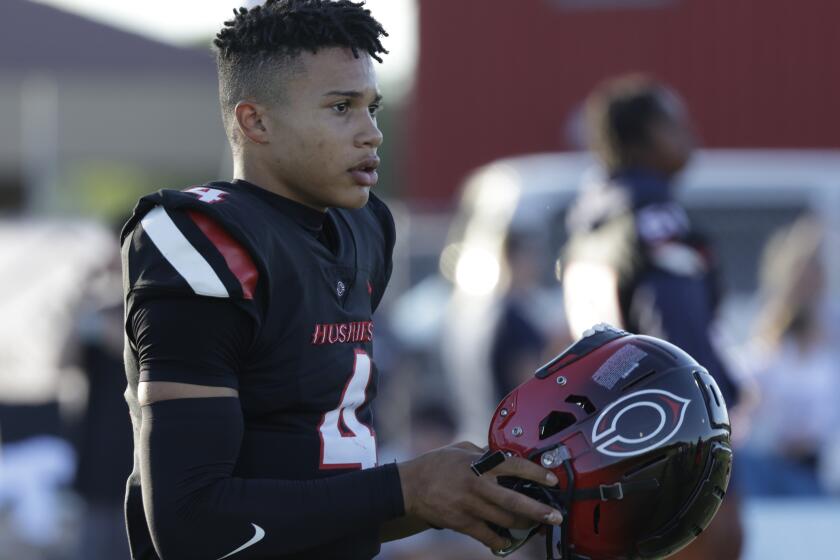THE COLLEGES / MIKE HISERMAN : Area Coaches Tolerate Nomads
Back-to-school shoppers were out in droves this summer. Forget what the retailers say.
All Jim Fenwick and Bill Norton had to do was unfurl “new management” signs at Valley and Pierce and looky-loos converged as if their football programs were K mart blue-light specials.
For that matter, business was brisk at other local junior colleges. It usually is.
Each summer, it seems, football practice attracts as many window shoppers as a summer sale.
No wonder the coaches cannot wait until the fall clearance.
In junior college football, players change teams as often as they change clothes. The rules let them.
Until an incoming freshman begins full-contact practice sometime in late August, he is allowed to traipse from camp to camp, shifting his allegiance as many times as is convenient.
As a result, coaches walk a fine line when deciding how to discipline or motivate players who have little loyalty to the team.
“There are times you need to raise your voice to correct a player or motivate somebody to get them to work a little harder,” Fenwick said. “But you get to a point when you wonder how hard you can push before the guy is going to want to quit and go (somewhere else).
“You have 70 different guys and each of them have their own story, their own reason for being at a JC, and they all react differently.”
Local coaches seem to agree that players should be able to study their options before deciding which school to attend.
“I don’t encourage shoppers, but it’s sort of a good thing for the kids,” Moorpark Coach Jim Bittner said. “They’re just looking for a place where they can play, so I don’t hold it against them.”
Norton has gone so far as to encourage players to sample practices at various schools before they reach a decision.
“I tell them to find out what they like and don’t like about each place and write it all down on a piece of paper,” Norton said. “That way, wherever they end up, at least they’ll remember why.”
However, most coaches would rather have some kind of binding commitment before the first day of practice in pads, normally about two weeks before school starts.
“As it is, the worst thing about JC football is that the rules encourage the kids not to be stable,” Norton said. “I’ve seen guys taking a physical at Glendale College one night and they’re someplace else the next day.”
Fenwick has a typical tale of woe. He thought he had successfully recruited a freshman quarterback and punter. But after practicing with Valley early in the summer, both players changed schools.
“It can be pretty confusing to a kid, especially when he has four or five choices,” Fenwick said of the recruiting process. “Even if they say they’re coming, you have to recruit them right up until that first practice in pads.”
Norton, who favors a July 1 deadline for new players to settle in, knows of players who have tried as many as four schools.
“You’ll get a guy, a receiver who can’t run and can’t catch, and we’ll say, ‘Son, you’re not going to play much,’ ” Norton said. “And the guy’ll say, ‘Well, I’m going over to Moorpark then.’
“And I’ll say, ‘Well, good, because I’m sure they want guys who can’t catch over there as their receivers.’ It’s going to be the same thing all over again no matter where the kid goes, but sometimes they have to find out for themselves.”
Most frustrated is a coach who invests time in developing a good player, only to lose him.
“They get you all excited, and then they leave,” Bittner said. “You think you have things pretty much settled and then, suddenly, they don’t show up. Of course, it would be nice if they at least let you know, but they never do. You just sort of hear via the grapevine (where they are).”
Although such occurrences are common, all the shifting can strain the relationship between coaches from opposing schools.
“When you lose a good one, it bothers you,” Bittner said. “You can’t help but feel like, ‘What did that (coach) do that I didn’t do?’ ”
Junior college coaches feel particularly vulnerable because player turnover is a problem anyway.
At Moorpark, Bittner’s schemes on offense have varied from the run-and-shoot to a straight drop-back passing game, depending on the strengths of his personnel.
And if the personnel should change?
“You pencil everything out and think, ‘Oh, boy, we’re all set here,’ and then . . . they’re all gone,” Bittner said. “But then here comes Christmas and someone bounces in you didn’t know was coming.
“If you’re a nervous-type guy, JC football is not for you.”
Get our high school sports newsletter
Prep Rally is devoted to the SoCal high school sports experience, bringing you scores, stories and a behind-the-scenes look at what makes prep sports so popular.
You may occasionally receive promotional content from the Los Angeles Times.




